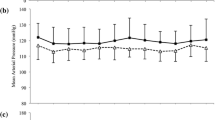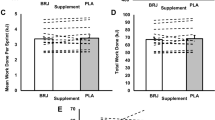Abstract
Purpose
To investigate the effect of acute l-arginine (L-ARG) supplementation on cardiovascular and thermoregulatory responses to rest, exercise, and recovery in the heat.
Methods
Eight healthy men (age 27 ± 6 years; stature 176 ± 6 cm; body mass 76 ± 4 kg; maximal power output 237 ± 39 W) participated in a double-blind, crossover study, attending the laboratory for two experimental trials. On each occasion, participants consumed 500 ml of a blackcurrant-flavoured cordial beverage 30 min before completing a 90 min experiment in the heat (35 °C and 50 % rh). The experiment consisted of 30 min of seated rest, followed by 30 min submaximal cycling (60 % maximal power output) and 30 min passive seated recovery. On one visit the drink contained 10 g of dissolved L-ARG while on the other visit it did not.
Results
L-ARG supplementation increased plasma L-ARG concentrations (peak +223 ± 80 % after 60 min of the 90 min experiment); however, supplementation had no effect on rectal temperature, mean skin temperature, heart rate, arterial pressure, forearm skin vascular conductance, oxygen consumption or sweat loss at rest, during exercise, or during recovery in the heat (p > 0.05).
Conclusion
Acute ingestion of 10 g L-ARG supplementation failed to elicit any changes in the cardiovascular or thermoregulatory responses to active or passive heat exposure in young, healthy males.


Similar content being viewed by others
Abbreviations
- ANOVA:
-
Analysis of variance
- CVC:
-
Cutaneous vascular conductance
- CVCmax :
-
Maximal cutaneous vascular conductance
- DAP:
-
Diastolic arterial pressure
- eNOS:
-
Endothelial nitric oxide synthase
- HR:
-
Heart rate
- l-ARG:
-
l-arginine
- MAP:
-
Mean arterial pressure
- nNOS:
-
Neuronal nitric oxide synthase
- NO:
-
Nitric oxide
- NO2 :
-
Nitrite
- NOS:
-
Nitric oxide synthase
- PLA:
-
Placebo trial
- rh:
-
Relative humidity
- SAP:
-
Systolic arterial pressure
- T rectal :
-
Rectal temperature
- T skin :
-
Mean-weighted skin temperature
- VO2 :
-
Oxygen consumption
- W max :
-
Maximal power output
References
Adams MR, McCredie R, Jessup W, Robinson J, Sullivan D, Celermajer DS (1997) Oral l-arginine improves endothelium-dependent dilatation and reduces monocyte adhesion to endothelial cells in young men with coronary artery disease. Atherosclerosis 129:261–269
Alvares TS, Conte-Junior CA, Silva JT, Paschoalin VM (2012) Acute l-arginine supplementation does not increase nitric oxide production in healthy subjects. Nutr Metab (Lond) 9:54
American College of Sports Medicine Position Stand and American Heart Association (1998) Recommendations for cardiovascular screening, staffing, and emergency policies at health/fitness facilities. Med Sci Sports Exerc 30:1009–1018
Bailey SJ, Fulford J, Vanhatalo A, Winyard PG, Blackwell JR, DiMenna FJ, Wilkerson DP, Benjamin N, Jones AM (2010a) Dietary nitrate supplementation enhances muscle contractile efficiency during knee-extensor exercise in humans. J Appl Physiol (1985) 109:135–148
Bailey SJ, Winyard PG, Vanhatalo A, Blackwell JR, DiMenna FJ, Wilkerson DP, Jones AM (2010b) Acute l-arginine supplementation reduces the O2 cost of moderate-intensity exercise and enhances high-intensity exercise tolerance. J Appl Physiol (1985) 109:1394–1403
Bailey SJ, Blackwell JR, Lord T, Vanhatalo A, Winyard PG, Jones AM (2015) L-citrulline supplementation improves O2 uptake kinetics and high-intensity exercise performance in humans. J Appl Physiol (1985) jap
Baydoun AR, Emery PW, Pearson JD, Mann GE (1990) Substrate-dependent regulation of intracellular amino acid concentrations in cultured bovine aortic endothelial cells. Biochem Biophys Res Commun 173:940–948
Bescos R, Gonzalez-Haro C, Pujol P, Drobnic F, Alonso E, Santolaria ML, Ruiz O, Esteve M, Galilea P (2009) Effects of dietary l-arginine intake on cardiorespiratory and metabolic adaptation in athletes. Int J Sport Nutr Exerc Metab 19:355–365
Bode-Boger SM, Boger RH, Galland A, Tsikas D, Frolich JC (1998) l-Arginine-induced vasodilation in healthy humans: pharmacokinetic-pharmacodynamic relationship. Br J Clin Pharmacol 46:489–497
Clarkson P, Adams MR, Powe AJ, Donald AE, McCredie R, Robinson J, McCarthy SN, Keech A, Celermajer DS, Deanfield JE (1996) Oral l-arginine improves endothelium-dependent dilation in hypercholesterolemic young adults. J Clin Invest 97:1989–1994
Closs EI, Scheld JS, Sharafi M, Forstermann U (2000) Substrate supply for nitric-oxide synthase in macrophages and endothelial cells: role of cationic amino acid transporters. Mol Pharmacol 57:68–74
Ferguson SK, Hirai DM, Copp SW, Holdsworth CT, Allen JD, Jones AM, Musch TI, Poole DC (2013) Effects of nitrate supplementation via beetroot juice on contracting rat skeletal muscle microvascular oxygen pressure dynamics. Respir Physiol Neurobiol 187:250–255
Forbes SC, Harber V, Bell GJ (2013) The acute effects of l-arginine on hormonal and metabolic responses during submaximal exercise in trained cyclists. Int J Sport Nutr Exerc Metab 23:369–377
Giugliano D, Marfella R, Verrazzo G, Acampora R, Coppola L, Cozzolino D, D’Onofrio F (1997) The vascular effects of l-arginine in humans. The role of endogenous insulin. J Clin Invest 99:433–438
Govoni M, Jansson EA, Weitzberg E, Lundberg JO (2008) The increase in plasma nitrite after a dietary nitrate load is markedly attenuated by an antibacterial mouthwash. Nitric Oxide 19:333–337
Holowatz LA, Thompson CS, Kenney WL (2006) l-Arginine supplementation or arginase inhibition augments reflex cutaneous vasodilatation in aged human skin. J Physiol 574:573–581
Johnson JM, Kellogg DL Jr (2010) Thermoregulatory and thermal control in the human cutaneous circulation. Front Biosci (Schol Ed) 2:825–853
Keen JT, Levitt EL, Hodges GJ, Wong BJ (2015) Short-term dietary nitrate supplementation augments cutaneous vasodilatation and reduces mean arterial pressure in healthy humans. Microvasc Res 98:48–53
Kellogg DL Jr, Pergola PE, Piest KL, Kosiba WA, Crandall CG, Grossmann M, Johnson JM (1995) Cutaneous active vasodilation in humans is mediated by cholinergic nerve cotransmission. Circ Res 77:1222–1228
Kellogg DL Jr, Liu Y, Kosiba IF, O’Donnell D (1999) Role of nitric oxide in the vascular effects of local warming of the skin in humans. J Appl Physiol (1985) 86:1185–1190
Kellogg DL Jr, Zhao JL, Friel C, Roman LJ (2003) Nitric oxide concentration increases in the cutaneous interstitial space during heat stress in humans. J Appl Physiol 94:1971–1977
Kellogg DL Jr, Zhao JL, Wu Y (2009) Roles of nitric oxide synthase isoforms in cutaneous vasodilation induced by local warming of the skin and whole body heat stress in humans. J Appl Physiol (1985) 107:1438–1444
Koppo K, Taes YE, Pottier A, Boone J, Bouckaert J, Derave W (2009) Dietary arginine supplementation speeds pulmonary VO2 kinetics during cycle exercise. Med Sci Sports Exerc 41:1626–1632
Kuennen M, Jansen L, Gillum T, Granados J, Castillo W, Nabiyar A, Christmas K (2015) Dietary nitrate reduces the O cost of desert marching but elevates the rise in core temperature. Eur J Appl Physiol
Kuipers H, Verstappen FT, Keizer HA, Geurten P, van Kranenburg G (1985) Variability of aerobic performance in the laboratory and its physiologic correlates. Int J Sports Med 6:197–201
Lansley KE, Winyard PG, Fulford J, Vanhatalo A, Bailey SJ, Blackwell JR, DiMenna FJ, Gilchrist M, Benjamin N, Jones AM (2011) Dietary nitrate supplementation reduces the O2 cost of walking and running: a placebo-controlled study. J Appl Physiol (1985) 110:591–600
Levitt EL, Keen JT, Wong BJ (2015) Augmented reflex cutaneous vasodilatation following short-term dietary nitrate supplementation in humans. Exp Physiol
McConell GK (2007) Effects of l-arginine supplementation on exercise metabolism. Curr Opin Clin Nutr Metab Care 10:46–51
McNamara TC, Keen JT, Simmons GH, Alexander LM, Wong BJ (2014) Endothelial nitric oxide synthase mediates the nitric oxide component of reflex cutaneous vasodilatation during dynamic exercise in humans. J Physiol 592:5317–5326
Mills PC, Marlin DJ, Scott CM, Smith NC (1997) Nitric oxide and thermoregulation during exercise in the horse. J Appl Physiol (1985) 82:1035–1039
Moncada S, Higgs A (1993) The l-arginine-nitric oxide pathway. N Engl J Med 329:2002–2012
Palmer RM, Ferrige AG, Moncada S (1987) Nitric oxide release accounts for the biological activity of endothelium-derived relaxing factor. Nature 327:524–526
Ramanathan NL (1964) A new weighting system for mean surface temperature of the human body. J Appl Physiol 19:531–533
Rector TS, Bank AJ, Mullen KA, Tschumperlin LK, Sih R, Pillai K, Kubo SH (1996) Randomized, double-blind, placebo-controlled study of supplemental oral l-arginine in patients with heart failure. Circulation 93:2135–2141
Schaefer A, Piquard F, Geny B, Doutreleau S, Lampert E, Mettauer B, Lonsdorfer J (2002) l-arginine reduces exercise-induced increase in plasma lactate and ammonia. Int J Sports Med 23:403–407
Tang JE, Lysecki PJ, Manolakos JJ, MacDonald MJ, Tarnopolsky MA, Phillips SM (2011) Bolus arginine supplementation affects neither muscle blood flow nor muscle protein synthesis in young men at rest or after resistance exercise. J Nutr 141:195–200
Vanhatalo A, Bailey SJ, Blackwell JR, DiMenna FJ, Pavey TG, Wilkerson DP, Benjamin N, Winyard PG, Jones AM (2010) Acute and chronic effects of dietary nitrate supplementation on blood pressure and the physiological responses to moderate-intensity and incremental exercise. Am J Physiol Regul Integr Comp Physiol 299:R1121–R1131
Vanhatalo A, Fulford J, Bailey SJ, Blackwell JR, Winyard PG, Jones AM (2011) Dietary nitrate reduces muscle metabolic perturbation and improves exercise tolerance in hypoxia. J Physiol 589:5517–5528
Wylie LJ, Mohr M, Krustrup P, Jackman SR, Ermiotadis G, Kelly J, Black MI, Bailey SJ, Vanhatalo A, Jones AM (2013) Dietary nitrate supplementation improves team sport-specific intense intermittent exercise performance. Eur J Appl Physiol 113:1673–1684
Acknowledgments
The authors would like to thank the participants for their time and effort, Tom Reeve (University of Roehampton, UK) for his technical support and assistance, and Nottingham Trent University for the loan of equipment.
Author information
Authors and Affiliations
Corresponding author
Ethics declarations
Conflict of interest
No conflicts of interest, financial or otherwise, are declared by the authors.
Ethical approval
All procedures performed in studies involving human participants were in accordance with the ethical standards of the institutional and/or national research committee and with the 1964 Helsinki declaration and its later amendments or comparable ethical standards.
Additional information
Communicated by Narihiko Kondo.
Rights and permissions
About this article
Cite this article
Tyler, C.J., Coffey, T.R.M. & Hodges, G.J. Acute l-arginine supplementation has no effect on cardiovascular or thermoregulatory responses to rest, exercise, and recovery in the heat. Eur J Appl Physiol 116, 363–371 (2016). https://doi.org/10.1007/s00421-015-3295-5
Received:
Accepted:
Published:
Issue Date:
DOI: https://doi.org/10.1007/s00421-015-3295-5




